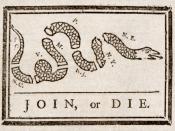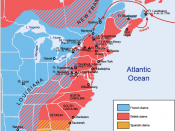Since the early seventeenth century to the start of the American Revolution, colonists developed a strong sense of unity and identity as Americans, as they came together to revolt against British oppression, ultimately affecting the development of the American political system, its economy, and its people. However, this did not signify that the colonies unified for the sole purpose of independence, rather the unification was also the result of many historical events, such as the Great Awakening, the Seven Year's War, and the end of England's salutary neglect. Eventually, American colonies established their own identity, distinct from the British character, through political, religious, economical, and social means. The separation of the American colonies from England permitted colonies to merge together and form one entity: America.
As colonies separated from England, they began to unify themselves through various political developments. The British colony of Jamestown exhibited political unity when it formed a representative house of self-government, referred to as the House of Burgesses, which permitted the colony to write its own laws.
Even the Mayflower Compact of 1620 demonstrates this sense of unity as it was an agreement among all settlers to form a government. In fact, this document served as "a great laboratory of liberty" (44), a step toward democratic self-government (Bailey and Kennedy 43).
Salutary neglect was a primary factor in the political development of the American colonies. England added to the colonists' mutiny, as it paid no respect to their general welfare. Because the English king disapproved of New Haven harboring two judges who had sentenced his father to death, the English king forced New Haven to join with Connecticut, which united the two colonies. Also, this king was responsible for revoking the Massachusetts Bay Colony's charter. The English lost favor in the eyes of the Puritans,


